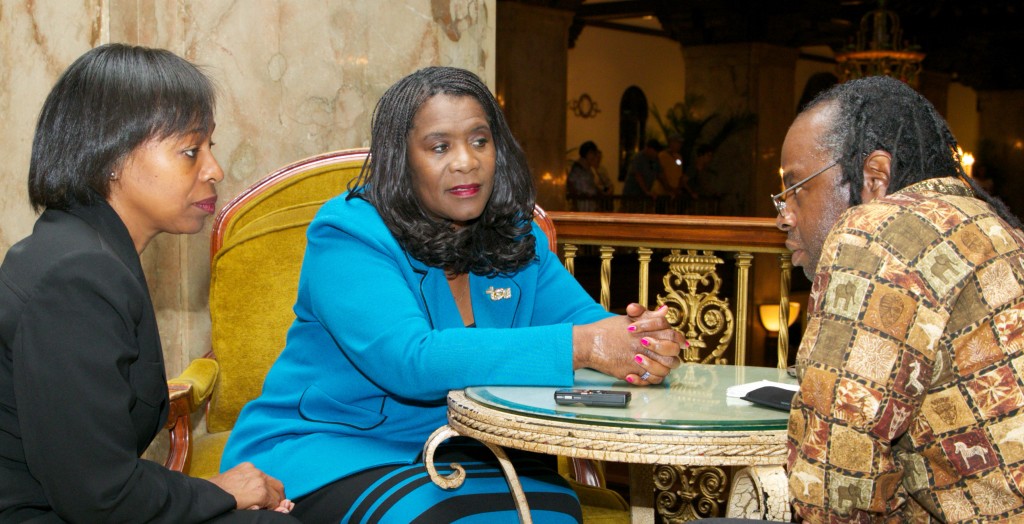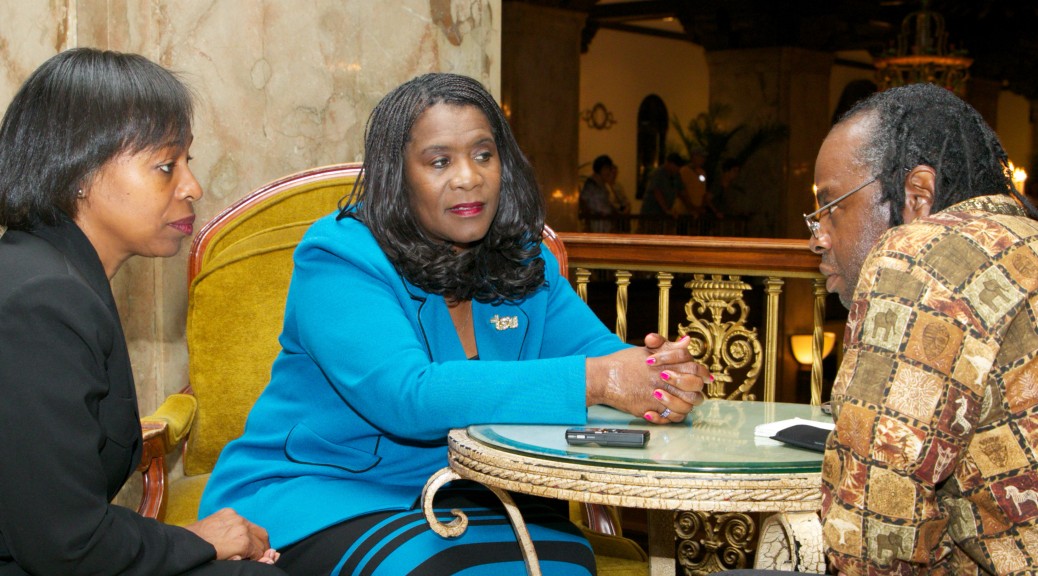Courtesy of the Tri-State Defender
Firmly anchored in the present, Tennessee State University President – and Memphis product – Dr. Glenda Baskin Glover takes a look back to her January 2013 start and peeks forward in a sit-down exclusive with the “Tri-State Defender.”
Dr. Glenda Baskin Glover took over as president of TSU in January 2013 with a five-point plan: (1) academic progress and customer service, (2) fund raising and partnerships, (3) diversity and inclusion, (4) shared governanceand (5) business outreach.

“It’s an honor to have grown up in Memphis and then to attend TSU and then to come back as president. It’s such an awesome blessing and I don’t take that lightly. I don’t for any reason think that that is a given,” said Glover during an interview at The Peabody Hotel as the Southern Heritage Classic Weekend of activities unfolded. “I know there are expectations. You asked if there was something the alumni expected. They demand accountability and rightly so. … I am enjoying it, embracing it,” she said, tipping her hat to a quality team of administrators.
Together, and with the support of alumni, the team has managed to increase enrollment, even as enrollment at the other five Tennessee Board of Regents universities stayed the same or declined. And it has done so against the challenge presented by the Tennessee Promise initiative, which offers two years of tuition-free community or technical college to Tennessee high school graduates beginning with the Class of 2015.
Karanja A. Ajanaku: On a macro level, what do you see as the purpose of a university?
Dr. Glenda Baskin Glover: A university exists for more than one reason. It exists first to educate students, to impart the knowledge they will need to function in their daily lives in a professional arena. Then secondly, it is to improve the wellbeing, the overall well roundedness of our students. That’s what a university is for.
KAA: So coming down to the micro level and looking at Tennessee State, how well do you say you are doing?
Dr. Glover: We are doing an outstanding job of educating students. Over the years I can give you the names of TSU alums who have done well and made their marks on life. We continue to carry out our mission of serving a population that really needs us. We serve largely Tennessee students but we are open to all students who apply and meet the standards and criteria we have set for TSU and approved by our governing boards.
KAA: Coming in, you had something in your mind, like a baseball manager with a three to five year plan. A few years in, where do you see that you are relative to the plan that you came in with?
Dr. Glover: We are on track, maybe a little bit ahead of schedule. When I came, I had a five-point vision. I knew it would take three to five years. First and foremost was student progress, make sure students are progressing as speedily as necessary through the academic system. (And) to improve the customer service as it related to students. Students who go to TSU deserve the right and opportunity and support they need to graduate. And that is our mission. To get the students the proper amount of knowledge and understanding so that when they are deposited back into the larger community, the larger world, they will be able to function and excel.
KAA: So you had plan and you come in. Did you find anything that you didn’t expect and you said, “Wow, I’ve got to adjust my plan?”
Dr. Glover: There were some things that caught me off guard. The quietness of the faculty and staff, initially there was not much communication. I’m not sure if there was some reason perhaps that they thought they might be penalized for speaking with the president, for being open and candid. So I wanted to make sure that they understood that I am here because the students are here. Whatever it takes to advance the students, I want to hear that. I want to know if there is an issue that has come up obstructing the path. We want to be open, honest and transparent. There are no hidden agendas when it comes to this administration. We are totally focused on students and making sure that students get a better life when they graduate. And the professional world they are looking for, we make sure they are ready for that. The second amazement to me …one of the rules that we have in Tennessee is that as you grow and need new buildings, somehow TSU is responsible for 25 percent of that. That was a shocker. I’ve never been in a system where the actual administration was responsible for a fourth of the funding of a facility. That was quite new, but again, once I learned the rules, I have to function within those rules and we function very well within those rules.
KAA: You get a lot of Memphis students historically. They have been trying to raise the standards here. I am curious as to what (caliber) you are receiving and what, if anything, special you have to do to help students that are sort of academically challenged.
Dr. Glover: Actually, Memphis students are no different from students across the country that we admit. We have excellent students from Memphis and we have some others who have some challenges. We want to make sure that we serve the students and service the students and meet their needs where they are. Everybody is not cut out to be an engineer major or a CPA. On the other hand, they might be cut out to be music majors. We help students find their proper pursuit and then move in that direction.
KAA: Are there any new programs or initiatives that you are bringing on board this year, or soon?
Dr. Glover: Yes. We know that STEM and health care, those two areas, are probably hottest in the academic arena, in the professional arena…. So we combined the life and physical sciences – biology, chemistry, math, physics – so we could have a better focus on the STEM areas and keep those students who are really STEM oriented and make sure that we provide an education for them that is conducive to what they need…We have engineering by itself and put the others together.
KAA: We ran a story in our newspaper this week where a couple of HBCU graduates were really making a plea for alumni to not forgot the schools and to step up, particularly from a financial standpoint. What are you experiencing with your alumni?
Dr. Glover: I have the person with me (Eloise Abernathy Alexis, associate vice president of Institutional Advancement) who is over alumni affairs.
KAA: What are you experiencing relative to working with your alumni from a contribution standpoint? And what are you asking of them? And how are they responding?
Eloise Abernathy Alexis: Later this afternoon, we will be gathering our alumni and friends for that purpose; to say thank you to those who have been supportive of the institution. Tennessee State has a solid foundation of alumni who are connected and committed, giving of their talent and time. But also to let them know the current state of the university and the opportunities to invest even more significantly…. Corporations and foundations are asking us now, “Do the people that are closest to your institution support you?” …We know of the wonderful affinity that TSU alumni have for the university. So we are simply going to work together to make sure that love translates into gifts to the university.
KAA: Are they, the alumni, asking anything of you?
EAA: They are, meaningful engagement. They want to be connected and be able to come to events like the Southern Heritage Classic and to see us here and have access to the president. They also want to have engagement with students. TSU alumni come to campus and they get engaged in the general life of the college. They are mentors to our students.
Dr. Glover: One of our tenets was to excite the alumni. An excited alumni is a giving alumni. …I came in and led the pledge myself. …The first day I made a contribution of $50,000 because I wanted to be sure they understood my commitment. …We have an increased enrollment this year largely because of the alumni efforts. They send their own children to TSU, go out and help us recruit and tell the TSU story. We are having such a good time with this because there are six universities in the Tennessee Board of Regents system and of that six one had an increase, one stayed the same and four had a decline in enrollment. Of course Tennessee Promise, we believe, had a great effect on that. … We put together a mechanism as to how we would get around that. … I personally visited high schools and community colleges and met with Greek organizations and met with alumni around the country; asked them to help us to recruit talented students. …That’s what we did and it worked.
KAA: Tennessee State historically has been all African American. Over the years there has been a change in your population. I would like to know the breakdown. Even more, how has the change affected the idea of you being an HBCU?
Dr. Glover: TSU will always be an HBCU. I don’t want people to panic and say, “Oh they are admitting so many non-African Americans.” We’ve always had our doors opene, our arms wide open to students who met our standards. When students in Tennessee could not get into the University of Memphis, Vanderbilt or UT, we never had a prejudice of that sort that kept out students. We’ve always had an admission policy that was inclusive. …Having said that, non-African Americans see the value that they get, there is a value proposition they see. For less money they can get the same quality education. That’s what people are seeing. (About) 12 percent of our students are international students. That is tremendous growth. The African-American population is about 70 percent. I think the white population appears to be about 18 percent. And we embrace all students. …
Department of Media Relations
Tennessee State University
3500 John Merritt Boulevard
Nashville, Tennessee 37209
615.963.5331
About Tennessee State University
With more than 9,000 students, Tennessee State University is Nashville’s only public university, and is a comprehensive, urban, co-educational, land-grant university offering 38 undergraduate, 22 graduate and seven doctoral programs. TSU has earned a top 20 ranking for Historically Black Colleges and Universities according to U.S. News and World Report, and rated as one of the top universities in the country by Washington Monthly for social mobility, research and community service. Founded in 1912, Tennessee State University celebrated 100 years in Nashville during 2012. Visit the University online at tnstate.edu.
